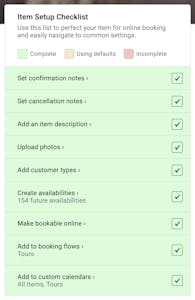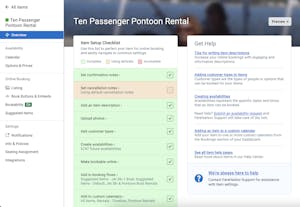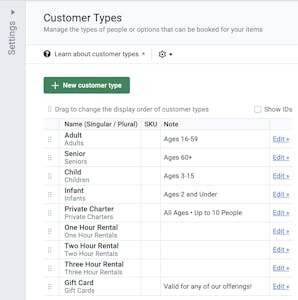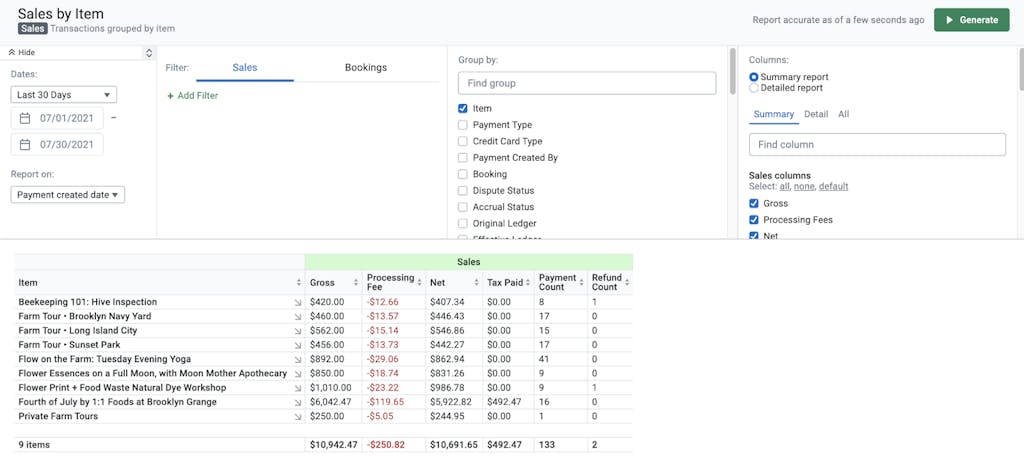- 9 minute read
- Business Management Tips
- Dashboard & FareHarbor
All Skill Levels
Get a behind-the-scenes-look into FareHarbor's 2024 season

Knowing your way around the FareHarbor Dashboard gives you the freedom to make adjustments to your calendar, items, customer types, and more.
Whether you’re updating your confirmation notes, adding health and safety policies, or generating a report, the Dashboard has everything you need to streamline bookings and access essential data about your conversions.
Use the terminology in this guide to take a deep dive into item setup, reporting, and other settings that will help you optimize your Dashboard for success. Be sure to check out FH Terminology Part 1 for a quick overview of basic Dashboard terminology.
Items: An item is anything that can be purchased or booked by your customers through FareHarbor. Follow the Item Setup Checklist to create your item correctly.
Item Setup Checklist: The checklist covers all the required and recommended settings for items, ensuring you get everything just right before your item is available to customers.
Bookability: The method that can be used to book an availability.
Confirmation Notes: Confirmation notes are included in the booking confirmation email sent to your customers. They can be set in your company Dashboard settings for all items, as well as for individual items.
Cancellation Policy Notes: A written summary of your cancellation policy. These notes are included on the online book form as well as all emails sent from the Dashboard. You can set cancellation notes universally for all items within Dashboard settings, or you can them for individual offerings through the item settings.

Resources: A resource is anything (a guide, kayak, tour bus, etc.) that can be “used” by a particular activity.
Shared Resources: The shared resources feature allows you to manage resources that are used for multiple activities, keeping track of their uses to avoid overbooking.
Customer Types: Define the types of people or options that can be booked for your activities. These will vary depending on your company’s setup and preferences. Customer types are included in every book form and are essential in determining pricing and capacity during the booking process.

Custom Field: Customized questions, text fields, or offerings on the book form to gather additional information from customers. Custom fields can be:
Customer-Level Custom Fields: Customer-level custom fields will be presented once per customer on the booking.
Whole Booking-Level Custom Fields: Whole booking-level fields will be presented one time per booking regardless of the number of customers on the booking.
Affiliates: Affiliates are any operators reselling your tours. These can range from concierges to larger online travel agencies (OTAs) like Tripadvisor/Viator, Expedia, and many more.
API Affiliates: For larger OTAs, we provide API Integrations that allow FareHarbor to automatically transfer data from OTA platforms to your Dashboard. This helps streamline your booking processes because you don’t need to manually enter affiliate bookings!
Affiliates Booking Direct: This gives affiliates limited access to your booking calendar so they can see live availability and make direct bookings without having to contact you.
Campaigns & Promo Codes: Campaigns allow you to offer discounts to your customers, such as a seasonal coupon code or a Groupon deal. Campaigns are created with a set of promotional codes and added to a custom field, which is then priced and assigned to an item.

Advanced Reports: Fully customizable reports using data from your Dashboard. These are broken down into five categories: Sales, Bookings, Customers, Custom Field Answers, and Expenses and Discounts.
Sales Reports: These reports show detailed data on all transactions that have occurred in the dashboard. These can range from Sales by Item/Availability to Accrual Accounting to determine all deferred and recognized revenue in the dashboard.
Deferred and Recognized Revenue: Money is deferred, or unearned, when it is taken for a future booking. Money is recognized, or earned, when the activity or event that it was collected for happens.
Bookings Reports: These reports show detailed data for all bookings in the dashboard. You can view bookings organized by offering, source (online, direct, or network), as well as number of cancelled/refunded bookings.
Customers Reports: These reports show a detailed breakdown of which customer type options were booked.
Custom Field Answers: The Custom Field Answers report can be used to gather useful information from your customers’ bookings. For example, you could set up a weekly report to track revenue for add-ons (such as retail or transportation fees) or see how many times a specific promo code has been used in the past 30 days.
Expenses and Discounts: Expenses and discounts can be used to adjust the booking total on a completed booking. The Expenses and Discounts report shows these adjustments and their related bookings for a given date range.
With these Dashboard shortcuts up your sleeve, you can navigate the FareHarbor backend like a pro! Ready to put your knowledge to the test? See if your Dashboard is ready to go for your busy season!